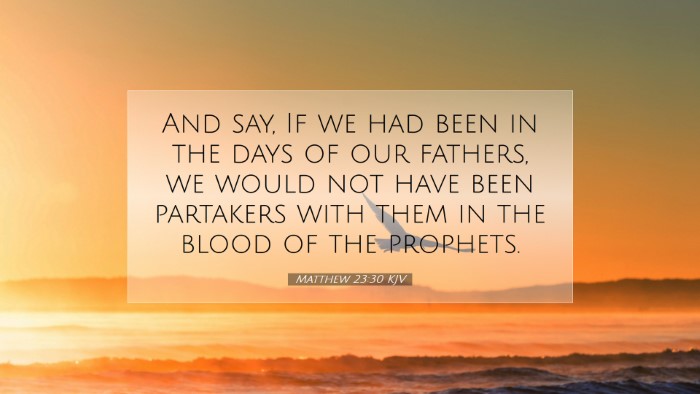Commentary on Matthew 23:30
Matthew 23:30 states: "And say, If we had lived in the days of our fathers, we would not have been partakers with them in the blood of the prophets." This verse is part of the final discourse by Jesus addressing the religious leaders of His time, particularly the scribes and Pharisees. It serves as a profound indictment against their hypocrisy and self-righteousness.
Contextual Analysis
To fully grasp the weight of this verse, it is essential to consider its context. This chapter is situated in the latter part of Jesus' ministry where He condemns the behavior of the religious elite. Prior verses outline the woes pronounced upon these leaders, illustrating their corrupt practices and the burdens they place on the people.
The Hypocrisy of Self-Deception
The statement "If we had lived in the days of our fathers..." exhibits a significant level of self-deception. Here, the scribes and Pharisees, in their arrogance, presume to judge the actions of their ancestors while failing to recognize their own parallel sins. Their claim denotes a disconnect from history, believing they would have acted differently from those who persecuted the prophets.
- Matthew Henry’s Insight: Henry emphasizes that this self-righteousness blinds them to their present culpability. He argues that the attitude reflects an unwillingness to see truth and reality. They believe they are above the failings of their forebears, yet they perpetuate the same patterns of behavior.
- Albert Barnes’ Commentary: Barnes notes that by making such a statement, they lay bare their ignorance of their own hearts. He suggests that the Pharisees’ words depict a lack of humility and a failure to acknowledge their innate propensity to sin.
- Adam Clarke’s Perspective: Clarke points out that this verse exposes the ingrained nature of human hypocrisy. He argues that people often consider themselves to be morally superior when, in fact, they can act in similar ways when faced with the same circumstances.
Historical Reflection
When speaking of "the days of our fathers," the religious leaders invoke the history of Israel, particularly the ongoing rejection and murder of prophets throughout biblical history. This reflection serves to heighten the irony, as they fail to see that they are on the brink of committing a similar act against Jesus, the ultimate prophet.
A historical lens reveals the repeated patterns of resistance to God's messengers. The people of Israel had often rebelled against divine guidance, leading to the persecution of those sent to call them back.
Theological Implications
This verse carries significant theological weight. The denial of one’s own failures not only distorts self-perception but also obscures understanding of God’s justice. The leaders' claim highlights a serious disconnect between their external religiosity and the internal spiritual blindness. It serves as a reminder that:
- Human Nature: The propensity to disown responsibility is a common thread in humanity, illustrating the fallen nature to rationalize sin.
- God’s Ongoing Call: This verse indicates God’s persistent effort in revealing truth to His people, despite their histories of unfaithfulness.
- Rejection of Authority: The attitude displayed by the Pharisees represents an ongoing theme of rejecting divinely sent authority figures throughout history.
Application for Today
For modern readers, particularly pastors and theologians, Matthew 23:30 poses essential questions about self-reflection and humility in ministry. The denial exhibited by the Pharisees serves as a cautionary tale against hypocrisy. It invites earnest introspection regarding the ways we assess our faith and that of others.
Consider applying the following reflections:
- Self-Examination: Regularly assess personal motives and actions in light of Scripture to guard against spiritual pride.
- Historical Awareness: Learn from the past mistakes of others, especially in church history to understand the continuous need for reform and renewal.
- Graciousness in Leadership: Approach leadership roles with humility, acknowledging that leaders are just as susceptible to failings.
Conclusion
In summary, Matthew 23:30 encapsulates a profound warning against the dangers of self-righteousness and a lack of self-awareness. The words spoken by the Pharisees serve to highlight the importance of recognizing our own sinful tendencies rather than projecting our failings onto others. As we embrace these insights, may we cultivate a spirit of humility that acknowledges our need for grace and draws us closer to the heart of God.


